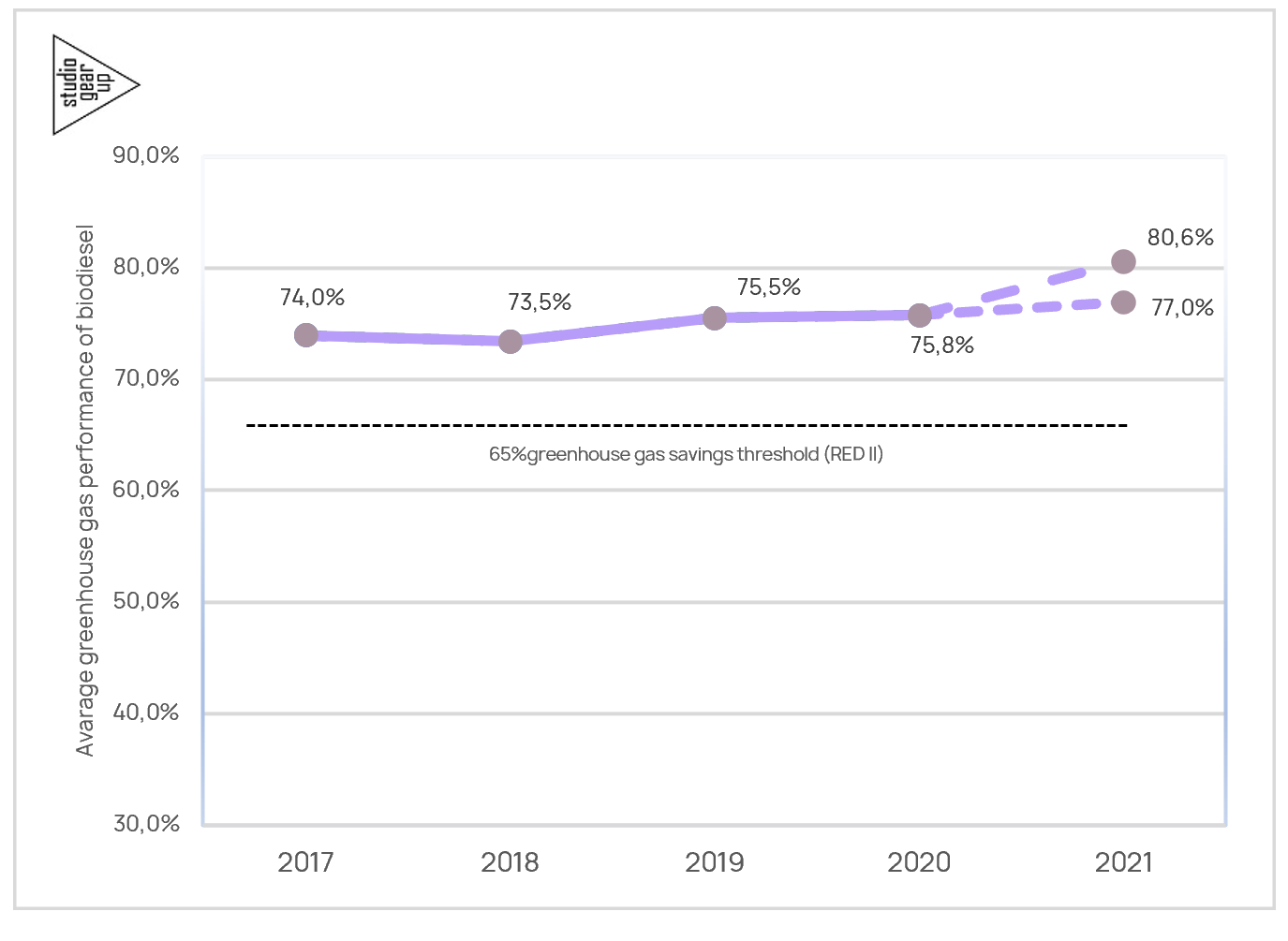July 2023
- Blog - Climate and Energy
Biodiesel: driving Greenhouse Gas (GHG) savings and a sustainable future
Understanding GHG savings and their environmental impact
Greenhouse gas (GHG) savings refer to the reduction in emissions of GHGs, such as carbon dioxide (CO2) and methane (CH4), which are major contributors to global warming and climate change. As these gases accumulate in the Earth's atmosphere, they trap heat, leading to adverse environmental impacts, such as extreme weather events and rising sea levels. Achieving substantial GHG savings is therefore crucial to tackle the climate crisis and ensure a more sustainable future.
Biodiesel's contribution to GHG savings
Biofuels are today's most relevant solution for reducing the EU's dependence on imported fossil fuels and GHG emissions from the transport sector, the only economic sector in Europe where emissions continue to grow. Biodiesel, derived from biogenic sources like vegetable oils, animal fats, wastes and residues, emerges as a key player in this endeavor, showcasing its environmental prowess through continuous improvements. The average emission savings per unit of biodiesel (FAME and HVO collectively) have been gradually increasing over time, and this positive trend continues in 2021.
 Latest findings on GHG savings per unit of biodiesel
In 2021, the use of biodiesel showcased impressive emission savings, with an estimated range of 77% to 81% compared to the official fossil fuel comparator of 94 gCO2eq/MJ. This remarkable reduction in emissions exemplifies biodiesel's potential to significantly curtail carbon footprints and combat climate change effectively.
The gradual rise in emission savings can be attributed to several key factors:
Latest findings on GHG savings per unit of biodiesel
In 2021, the use of biodiesel showcased impressive emission savings, with an estimated range of 77% to 81% compared to the official fossil fuel comparator of 94 gCO2eq/MJ. This remarkable reduction in emissions exemplifies biodiesel's potential to significantly curtail carbon footprints and combat climate change effectively.
The gradual rise in emission savings can be attributed to several key factors:
 Latest findings on GHG savings per unit of biodiesel
In 2021, the use of biodiesel showcased impressive emission savings, with an estimated range of 77% to 81% compared to the official fossil fuel comparator of 94 gCO2eq/MJ. This remarkable reduction in emissions exemplifies biodiesel's potential to significantly curtail carbon footprints and combat climate change effectively.
The gradual rise in emission savings can be attributed to several key factors:
Latest findings on GHG savings per unit of biodiesel
In 2021, the use of biodiesel showcased impressive emission savings, with an estimated range of 77% to 81% compared to the official fossil fuel comparator of 94 gCO2eq/MJ. This remarkable reduction in emissions exemplifies biodiesel's potential to significantly curtail carbon footprints and combat climate change effectively.
The gradual rise in emission savings can be attributed to several key factors:
- Increasing share of waste-based feedstock: The adoption of waste-based feedstock in biodiesel production has played a pivotal role in enhancing its environmental impact. From comprising about 47% in 2017, the share of waste-based feedstock has potentially risen to 65% in 2021. Utilizing waste materials for biodiesel production not only reduces emissions but also promotes the principles of a circular economy by maximizing resource utilization and minimizing waste.
- Improved performance of crop-based biodiesel: Advancements in crop-based biodiesel technology have led to improved performance, resulting in a potential reduction from about 36 g/MJ to 28 g/MJ. This increase in efficiency contributes to the overall enhancement of emission savings per unit of biodiesel.
- Increasing interest in transparent reporting: There has been a notable shift in reporting practices, with a rising interest in reporting actual GHG emission reductions instead of relying on default values. This emphasis on transparency and accountability encourages continuous improvement in emission reduction efforts.
 EBB Statistical Report 2023
EBB Statistical Report 2023
